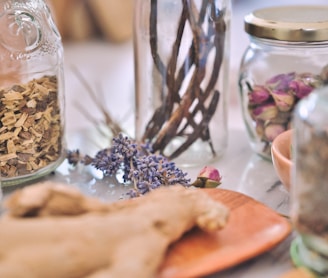Herbalism: A Beginner’s Guide to Natural Healing
HERBAL INSIGHTS


Herbalism is an ancient practice that involves the use of plants and plant extracts for medicinal purposes. It has been utilized across cultures for thousands of years, with a rich history rooted in traditional healing systems. As modern society seeks holistic approaches to health, herbalism has regained popularity as a natural remedy for various ailments. This article serves as a beginner's guide to understanding the principles of herbalism, its applications, and how to get started on your journey towards natural healing.
Understanding Herbalism
What is Herbalism?
Herbalism is defined as the study and use of medicinal plants to promote health and treat illness. It encompasses a wide range of practices, from the use of whole herbs in teas and tinctures to the extraction of essential oils. While herbalism can be traced back to ancient civilizations—such as the Egyptians, Chinese, and Greeks—it continues to evolve today, blending traditional wisdom with modern scientific research.
At its core, herbalism emphasizes the importance of using the whole plant, which often contains numerous compounds that work synergistically to promote healing. This holistic approach acknowledges that the body is a complex system and that plants can aid in restoring balance and harmony.
The Principles of Herbalism
Herbalism operates on several fundamental principles:
Holistic Healing: Herbalists view the body as an interconnected system. Healing is not just about alleviating symptoms; it’s about addressing the root cause of ailments and promoting overall wellness.
Individualization: Every person is unique, and herbal remedies are often tailored to an individual’s specific needs, constitution, and health conditions. What works for one person may not work for another.
Sustainability: Many herbalists prioritize the ethical sourcing of plants and advocate for sustainable practices in harvesting and using herbs to ensure that these natural resources remain available for future generations.
Integration with Lifestyle: Herbalism encourages integrating herbal remedies into one’s daily life alongside healthy dietary and lifestyle choices. This multifaceted approach helps to enhance overall health and well-being.
Getting Started with Herbalism
Research and Education
Before embarking on your herbalism journey, it's crucial to educate yourself about the different herbs, their properties, and how they can be used effectively. Here are some steps to get you started:
Read Books and Resources: Invest in reputable books on herbalism that cover the basics, herbal preparations, and specific herbs. Some recommended titles include "The Herbal Medicine-Maker's Handbook" by James Green and "Healing Herbal Teas" by Brigitte Mars.
Attend Workshops and Classes: Many communities offer herbal workshops, courses, or even online classes. Engaging with experienced herbalists can provide invaluable hands-on experience and insights.
Join Herbalist Groups: Connecting with local herbalist communities or online forums can enhance your learning experience. These platforms provide a space to ask questions, share experiences, and learn from others.
Identifying and Sourcing Herbs
As you delve into herbalism, consider the following when it comes to sourcing your herbs:
Wildcrafting: This involves foraging for wild herbs in their natural habitat. However, it’s crucial to be knowledgeable about plant identification to avoid toxic or endangered species. Always seek permission if foraging on private land.
Growing Your Own: Many herbs can be easily cultivated in home gardens or even on windowsills. Starting your herb garden allows for fresh, organic access to plants while providing an opportunity to connect with nature.
Buying from Reputable Sources: If foraging or growing your own herbs isn’t feasible, purchase herbs from trustworthy sources. Look for organic options or local herbal shops that emphasize quality and ethical practices.
Common Herbs and Their Uses
To begin your herbal journey, familiarize yourself with some commonly used herbs and their potential benefits:
Chamomile (Matricaria chamomilla): Known for its calming properties, chamomile is often used as a tea to promote relaxation and improve sleep quality.
Peppermint (Mentha piperita): This invigorating herb is great for aiding digestion and alleviating headaches. It can be consumed as a tea or used as an essential oil.
Echinacea (Echinacea purpurea): Frequently used to support the immune system, echinacea is believed to reduce the duration of colds and flu symptoms.
Ginger (Zingiber officinale): Known for its anti-inflammatory properties, ginger is commonly used to alleviate nausea, digestive discomfort, and sore throats.
Lavender (Lavandula angustifolia): With its soothing aroma, lavender is often used in aromatherapy to promote relaxation, relieve anxiety, and improve sleep.
Preparation and Usage
Understanding how to prepare and use herbs is crucial in herbalism. Here are some common methods of preparation:
Teas: Infusing dried or fresh herbs in hot water creates a simple herbal tea. This is one of the most common ways to enjoy the benefits of herbs.
Tinctures: Alcohol extracts of herbs, tinctures provide a concentrated form of herbal medicine. They can be taken directly or added to water.
Oils and Salves: Infusing herbs in carrier oils (like olive or coconut oil) can create soothing topical applications for skin conditions or aches.
Capsules and Powders: Many herbs can be dried, ground into powder, and placed into capsules for easier ingestion.
Safety and Precautions
While herbalism offers many benefits, it’s essential to approach it with caution:
Consult with Healthcare Professionals: Before starting any herbal regimen, especially if you have existing health conditions or are taking medications, consult with a healthcare provider knowledgeable about herbal medicine.
Allergic Reactions: Always conduct a patch test before using any herbal product topically. Some individuals may experience allergic reactions to specific plants.
Quality Control: Use high-quality herbs from reputable sources to avoid contaminants and ensure efficacy.
Conclusion
Herbalism presents a fascinating avenue for those interested in exploring natural healing methods. By understanding the principles of herbalism, educating yourself, and carefully sourcing and preparing herbs, you can embark on a journey toward better health. While herbal remedies can be powerful allies in promoting well-being, it’s essential to approach this practice with respect and mindfulness. As you delve deeper into the world of herbalism, you may find that nature offers a wealth of healing options waiting to be discovered.
